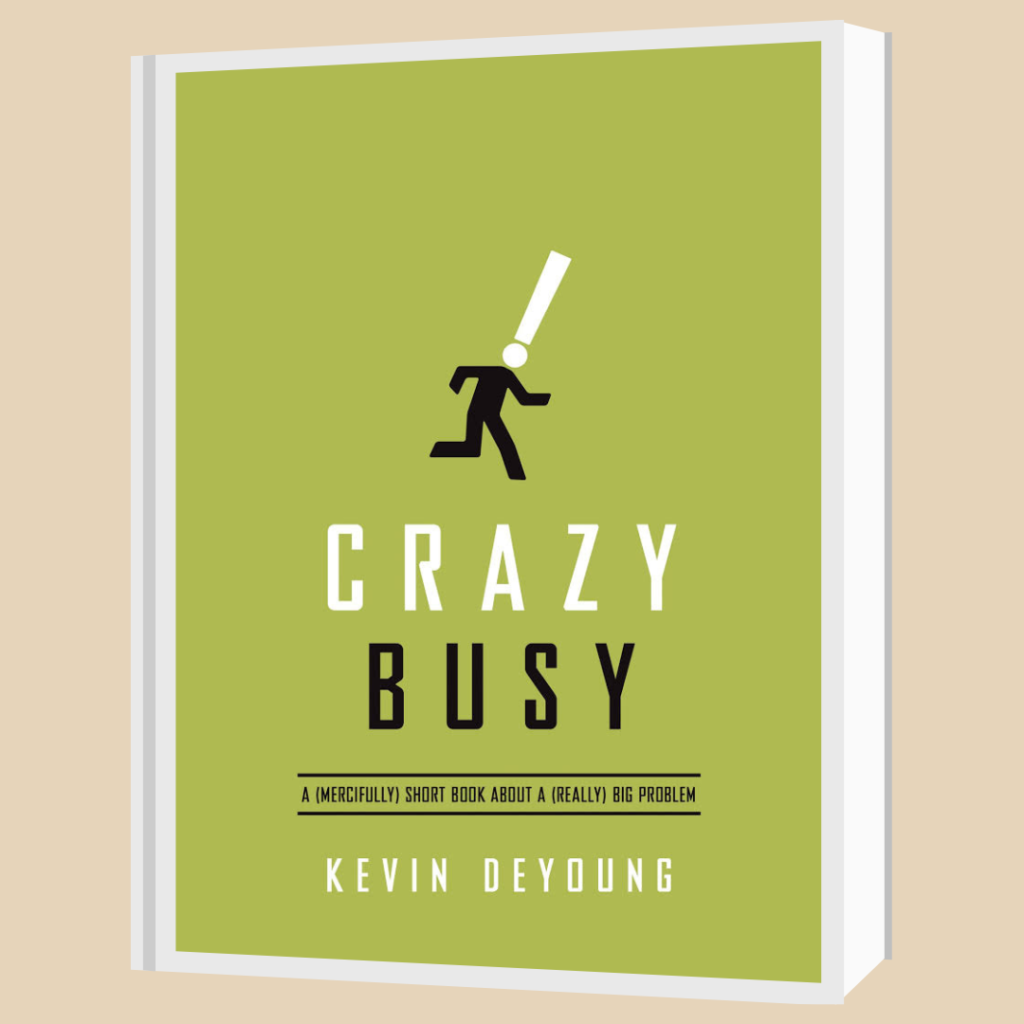Book Reviews
Crazy Busy: A (Mercifully) Short Book about a (Really) Big Problem, by Kevin DeYoung | Review by Rosa Byler

Those who pick up this book will most likely fall into one of two categories. Some of you will look at the title, mystified, and think “Crazy? Busy? What do those two adjectives have in common? And crazy busy what?” Others will instantly identify with the concept and feel a certain kinship with the cover diagram (a running figure, its head an outsized exclamation mark). If you are of the former group, don’t bother with this book. But if you have any immediate sense that this might be something you need to read, you are probably right.
Most of us have heard that if we want to get something done, we should look for a busy person to do it, because he will get the job done. Some people seem to naturally thrive on activity and accomplishment and quite happily load more onto their schedules. Others, gifted with diverse abilities and called to serve in numerous areas, suddenly find that they have taken on more than they can handle. Both types of people can easily become “crazy busy” (which can be defined as excessively busy, to the point of frustration and actual inefficiency) without intending to.
DeYoung acknowledges that he is at once the best and the worst person to write a book on busyness, because his life is “crazy busy.” His description of his high school and college years makes it apparent that he is “wired” that way. (Friends were astonished to hear that he was planning to write about one of his biggest weaknesses; DeYoung says he wrote the book “to figure out things I don’t know and to work on change I have not yet seen [14]” in order to experience progress himself.) He makes it clear that his book is neither a collection of time management tips nor a theological exposition on Sabbath rest. However, understanding our hearts and experiencing change require theology and practicality, and he offers both of those.
First on the agenda is a list of three dangers associated with busyness. It can rob us of joy, making us frazzled, irritable and stressed. (The busy person is generally not the only one suffering when this happens.) Busyness robs us of spiritual growth as the cares of life choke the Word of God. And busyness can cover up deeper, more serious issues—what DeYoung calls the “rot in our souls.”
Is crazy busyness merely a modern phenomenon? Is it actually harder for us than it was for our ancestors to strike a reasonable balance between sloth and over-commitment? DeYoung suggests that two aspects peculiar to our time play upon sinful tendencies present since the Fall: the complexity of our lives and the sheer volume of our opportunities (24). Picture yourself in a log cabin on the early American frontier or a mud hut in primitive Africa, and you will understand what he means by these.
What are some heart sources of our attraction to sinful busyness? DeYoung offers seven possible diagnoses. We might be suffering from one of pride’s many manifestations, which he calls “the killer P’s” (33). Among others, these include people-pleasing, poor planning, possessions, prestige, perfectionism, and posting (for those who don’t blog, tweet, or show your faces in an ever-increasing variety of methods, this refers to social media.) We may be trying to accomplish things God never intended us to do—what DeYoung calls “the terror of total obligation” (43).
Some people fail to set priorities and experience “mission creep” (53). This sinister-sounding term simply means that in pursuing lesser but more urgent-seeming needs, we move gradually away from our main calling. Focusing on the demands right in front of us makes it easy to disregard previous commitments and neglect our primary responsibilities.
Three other potential diagnoses are “child-obsessed parenting,” or in modern parlance “freaking out about our kids (65)”; letting “the screen” dominate our lives and asphyxiate our souls (also known as Internet addiction); and failing to establish healthy rhythms. We overestimate how much of our children’s future well-being depends upon us. We are overcome by the need to feel connected. And on the average, we sleep nearly two and a half hours fewer per night than did Americans a century ago!
The solution is not a life of idleness. Somewhat surprisingly, the seventh diagnosis is that we suffer more in busyness because we object to suffering. We expect life to be easy. God has given us work to do, and there will be tiredness and stresses associated with it. However, it is possible to serve and bear burdens with the right character and dependence on God rather than being “stressed and frenzied while actually accomplishing very little” (102). How do we get there? The last chapter, entitled “The One Thing You Must Do,” is a rationale for allowing God to minister to us in what is suitably called “devotions”: devoting ourselves to prayer and reading the Word.
Whether you are genetically programmed or environmentally pressured to be crazy busy (think “Mennonite work ethic” gone to seed) or have only overextended your natural abilities, this book is a wake-up call and a source of help. The problem is “really big,” but DeYoung outlines doable beginner steps on the pathway to balance. (You may find, as I did, that you are almost unconsciously tweaking unhealthy patterns soon after finishing the book.) Theological carefulness is blended with honesty and humor to produce a book that is well-written and easy to read!